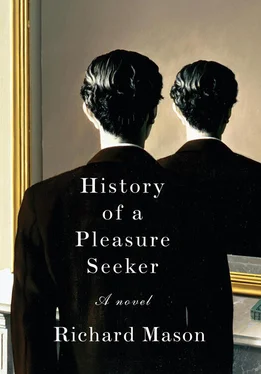The figure was so confidently astronomical that Piet was gripped by the idea of paying it, since for the first time in his life he could. His vague plans of New York shimmered a moment, then disintegrated. He was sure to be a success wherever he went. Besides, Africa was cheap, and life with so much native labor was bound to be comfortable. To sail to his future on a ship as luxurious as the Eugénie struck him as wholly appropriate. With his savings and the money Maarten had given him, he could afford a one-way passage and still have money left over to start his new life. It would not be as much as he had intended, but the South African War was over and calm restored; men had made fortunes in diamonds and gold. He was sure he could find a way to divert some of that free-flowing cash into his own pocket.
Observing the look on his client’s face, Mr. Huysman pressed home his advantage. “Every cabin in tourist class has hot running water, salt and fresh,” he murmured, “and taps plated in the latest white metals. The food is equal to that of the best restaurants in Paris.”
“A moment with my cousin, if you please,” said Didier.
“Of course, sir.”
As soon as the agent had withdrawn, Didier said, “That’s most of your money.”
“Cape Town will be less expensive than New York. I wouldn’t need so much.”
“But you’ll need some. You’ve had a stroke of luck. That’s not the same as being rich.”
But Piet was already imagining himself in a mahogany deck chair, being fawned over by obliging stewards; and the vision’s foolhardiness was part of its appeal. “I’d have enough to get by for a few months. And, more important, to buy us dinner tonight. I’ll find some way of prospering once I’m there. Think of the fun of a seventeen-day voyage! You never know who you might meet.”
“Don’t be a fool.”
But this only fortified Piet’s resolve. With a young man’s delight in showing off to a friend he called the agent back and paid for the cabin then and there and emerged into the dwindling light aware that he had made a wager with Fortune and confident of winning it.
They went to the Karseboom, a music hall and tavern frequented by a boisterous crowd. As he pushed his way to the bar behind Piet, Didier did not miss the chance to press heavily against him or to lean so close to make himself heard that their cheeks touched. Piet’s immediate proximity eased the looming wrench of his departure.
“When will you tell your father?” he shouted as their beers were set before them.
“At Christmas. He won’t mind.”
“Won’t he miss you?”
“He’s not sentimental.”
“Mine would have a fit if I went off to the other side of the world.”
Piet thought of the genial Monsieur Loubat, and for the first time all day a trickle of sorrow contaminated his triumph. “My father’s not like yours,” he said briefly. “Let’s play billiards.”
The game of Wilhelmina billiards was taken seriously at the Karseboom. Piet and Didier secured one of the twenty-four tables but they were soon challenged for it; and their joint defense was so successful they drew a large crowd. Didier was an indifferent player, but Piet’s presence combined with just the right amount of alcohol unleashed a long run of luck. The watching women sided with the handsome “cousins” and their cheers prompted them to accept ever greater bets, which they won as if claiming a natural right. At eleven they adjourned for supper with fistfuls of coins and a pewter flask pledged in lieu of cash. They selected two of the most forward spectators to join them at it. These ladies made it clear, as they ate beef and oysters, that they were prepared to lower their prices considerably for the pleasure of entertaining their hosts for the night.
The one with her hand on Didier’s thigh was called Greetje. “Two is better than one, and four is better than two,” she whispered, brushing her lips against his ear. She had had a long run of foul-smelling, middle-aged men. Since she had to be where she was, she did not want to pass up the chance of Didier Loubat and Piet Barol. Neither did her colleague Klara, who at that moment was sliding her finger under the waistband of Piet’s trousers.
The thought of sharing these women in naked abandon with Piet Barol made Didier do some calculations of his own. His yearly bottle of Chartreuse aside, he permitted himself few luxuries. He had many uses for his half of the winnings, and yet — He would never have the chance again. He considered the practicalities. “Have you a place?”
“Not a minute’s walk from here.”
“I’ll put it to my friend.”
But Piet would not. He had a horror of venereal disease, gained from the nasty pustules exhibited by certain university acquaintances, and was quite imaginative enough to know that many had preceded him with Klara and paid for the honor (not always very well). As her vulgar polished nails clawed the tender flesh of his backside, he was seized by an urgent longing for the chaste, patrician Jacobina.
They had had no contact since the day he carried Egbert out onto the street. Both had shunned the indecency of the idea. But Piet had now cured Jacobina’s son. He had honored his conscience’s debt to Maarten and showed her that she had no reason to chastise him. He was slightly appalled that Didier should wish to cavort with two women of the night and told him sternly that a man like him did not have to pay for pleasure.
Didier took this as a terrific compliment and was consoled. They walked home through the chilly air, arms about each other’s shoulders, uncoordinated from drinking. Didier was half a head taller and their hold was not wholly comfortable; but neither let go. As they turned onto the Leidsegracht, Piet stopped. Above the unlit street the night sky was bright with starlight. The waters of the canal reflected the houses faintly; they were entirely alone. “I’ll be sorry to leave all this,” he said contemplatively. “And you, of course.”
What would happen if I kissed him now? Didier wondered. But he did not dare. Piet had never shown any inclination that way, and yet— He is standing with his arm around me, in a beautiful place, late at night . Didier had slept with men encountered in far less tender circumstances. Testing the possibilities, he leaned heavily against his friend’s unyielding body and said, “I can barely stand, I’m so drunk.” He knew that a few feet farther on, beneath the bridge, was a small quay sheltered from wind and prying eyes. It was a place he went to alone; it held no illicit memories. “I know somewhere we can sit.” He lurched forward, drawing Piet with him.
They climbed down the slippery steps and sat on Didier’s coat with their legs dangling over the water. Their knees knocked, but their descent had loosened their grip on each other. Piet opened the pewter flask they had won, which was half full of decent brandy. They passed it between them, cold fingers touching, and relived their exploits in the silver galleries. They praised each other extravagantly and agreed that it was marvelous to be grown-up. Didier stared at Piet’s profile, hoarding its memory.
“I bet those tarts are missing us,” he said. “How’s your married lady?”
“She’s been away.”
“Frustrating for you.”
“Unimaginably.”
They sat in silence, each thinking of sex. Didier broke it. “Have you cuckolded many husbands?”
“Hers is the second.”
“Whose was the first?”
Told of the mezzo-soprano at Leiden, Didier pretended to be less impressed than he was and produced some stories of his own — each lewder than the next, the genders of the participants carefully reversed. An atmosphere of bawdy candor grew up between the young men. Didier coarsened his language and considered provoking a friendly brawl. It would get their arms around each other again. “I should beat you for leaving me at Blok’s mercy,” he growled, laying the ground for provocation later.
Читать дальше












